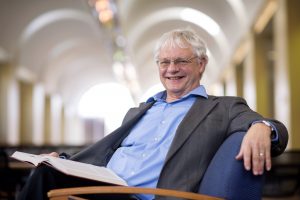Today, Professor Lloyd Kramer begins his term as Interim Chair of the Faculty, which will run through June 30, 2020. Per the Faculty Code, the Advisory Committee is charged with selecting an interim faculty chair when a vacancy arises. The committee solicited recommendations from the faculty and received several worthy nominations, including for Professor Kramer. They invited him to serve and he graciously accepted. You can learn more about Lloyd Kramer in his role as Chair of the Faculty here. He shared his thoughts about the position in his message to faculty below.
We hope you join us in welcoming Lloyd Kramer to this important leadership role.
May 8, 2019
I am honored to begin my service as Interim Chair of the Faculty. I appreciate the opportunity to represent the diverse and talented faculty of our University, and I hope to be an effective advocate for our shared values, commitments, and concerns. I thank the Advisory Committee and other faculty who have supported my appointment to this position and who have talked with me about the importance of faculty governance.
I also thank Professor Leslie Parise, who has served as the very hardworking and thoughtful Chair of the Faculty since the spring of 2017, and I appreciate the work of all those who served before her in this leadership position. Like every previous faculty leader, Leslie faced the challenges of internal and external conflicts; and her term was deeply affected by the controversial struggle to remove the Confederate statue from our campus.
Such issues will continue to affect our University in the coming year; and there will surely be new conflicts and debates as we find our way forward in a complex social and political context. We cannot know what lies ahead, but I know that I’ll be drawing on the legacy of previous chairs of the faculty who responded to other contentious issues by affirming the core values and enduring mission of our vibrant public institution. I am therefore honored to build on the work of past faculty leaders as we move the University toward the next phase of its complex, creative, and always evolving history.
I want to be a strong advocate for the faculty’s central role in the public mission of UNC-Chapel Hill, which includes service to the state as well as service to UNC students and the global network of scholarship, teaching, and advanced research in all academic fields. I want to explain to people outside the University why the faculty believe that diversity enhances our educational goals, why the faculty view a liberal arts education as a foundation for imaginative professional leadership and good jobs, and why the faculty defend academic freedom and free speech as essential principles for academic communities and for vital democratic societies.
More specifically, I want to listen to faculty colleagues and administrators throughout the University as we continue to learn from and respond to recent debates about our historical memory, our relations with the statewide University system, our new general education curriculum, and our changing financial/budgetary challenges. I will try to represent the faculty’s diverse interests, values, and concerns both within and beyond the University.
Faculty Governance has many aspects, from the Faculty Council meetings to the many hard-working committees that help to further the University’s overall mission. I appreciate the good work that our faculty colleagues are doing in these committees as they use their time and expertise to make UNC-Chapel Hill a strong, collaborative community; and I thank the Secretary of the Faculty, Vin Steponaitis, for his wide-ranging knowledge of all governance procedures.
The Chair of the Faculty should constantly affirm the public importance of our collective activities and be willing to raise challenging questions whenever key University values, human needs or faculty interests might be at risk. When we face difficult issues, I hope to expand the conversations through dialogues that sustain mutual respect and civility.
I share with you a deep allegiance to the values of our University. These values include a commitment to the free pursuit of knowledge and a willingness to listen to (and act upon) the concerns of faculty, staff, and students across our campus. I invite you to join our ongoing conversations as we continue to develop new dialogues in the coming year.
With best wishes,
Lloyd S. Kramer
Chair of the Faculty
Professor of History
Director of Carolina Public Humanities




